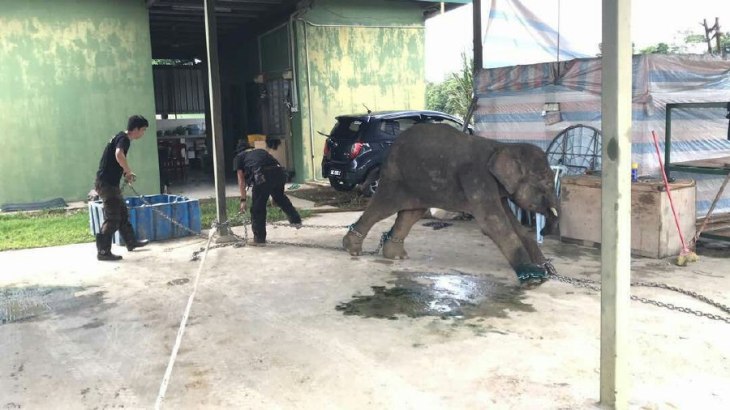
Terrible find: A Sabah Ranger standing beside the decomposed carcass of Liningkung at the Ulu Segama Forest Reserve on Sabah’s east coast
Photo:
Malaysia: Yet another endangered Borneo pygmy jumbo found dead in Sabah
14th December 2017;Another critically endangered Borneo Pygmy Elephant (Elephas maximus borneensis) has been found dead even as conservationists call for informants and professional investigators to be engaged to stop the killing.
The Elephant, the ninth slain in the last 14 months, was a healthy 12-year-old bull named Liningkung, that was fitted with a satellite collar 18 months ago.
It was found in the Ulu Segama Forest Reserve on Sabah’s east coast on Tuesday.
Rangers discovered its decomposed carcass with the tusks untouched.
“I believe it was shot by poachers but escaped before eventually dying from its wounds,” Danau Girang Field Centre (DGFC) director Benoit Goossens said.
Liningkung’s movements were being monitored by DGFC on a weekly basis, Goossens said, and they alerted Sabah Forestry officials on Dec 11 to say that it had not moved since Dec 3.
A team is in the area to carry out a post-mortem.
"It is another sad day for Elephant conservation. If this goes on, we might be staring at its extinction,” Goossens said.
There are only about 1,500 Elephants left in Sabah’s forests.
This is the third elephant found dead in the same area in the past year.
Goossens said it is vital for a special wildlife enforcement unit to be set up to go after wildlife poachers and traders as suggested by chief conservator of forests Datuk Sam Mannan.
Meanwhile, Marc Acrenaz, scientific director for Sabah-based wildlife research and conservation NGO Hutan, said informers and professional investigators are needed to stop the killing.
“Many years ago, locals killed these animals for food and it was not too serious.
"Now, we see that things have changed and people are poaching for the international trade or killing them because of animal-human conflicts,” he said.
No suspects have been identified in many of these cases, including a recent incident where a bull Elephant was shot in the mouth and died of dehydration because it could not eat or drink.
“The authorities lack people on the ground,” Acrenaz said.
“We need a strong team which can identify the culprits and bring them to justice,” he said, adding that the killings might stop then.
For now, Acrenaz said, there are not enough rangers to cover all the places where animals – especially endangered species like the Pygmy Elephants, Orang Utan (Pongo pygmaeus) and Pangolins (Manis javaica) – roam.
He said the three main reasons for poaching and killing were conflicts between landowners and animals (especially Elephants), poaching of bush meat because of demand by tourists, and the international underground trade in exotic meat and animal parts like ivory and Pangolin scales.
Source: The Star














